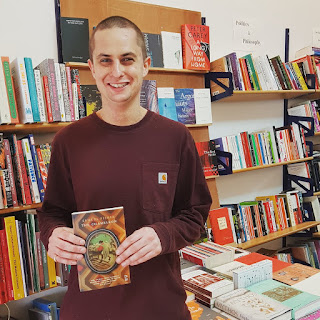In conversation with... Samuel Fisher
Hi Samuel! First of all, I would like to congratulate you on
the publication of The Chameleon! Can you please briefly tell us what it
is about?
A: It’s a book about a book that can be any book, narrated by that book.
What inspired you to write this book?
A: Books! And bodies. And the cold war. And the idea of storytelling as a common ground over which we can share our own unique experience.
How did you choose the books that John would turn into? Any choices that surprised you?
A: I never thought that Ancrene Wisse (a medieval guide for anchoresses) would make it into my creative work when I was studying it! I think, in general, I was interested in books that were concerned with book that interrogate their own process, that question the nature and value of storytelling.
If this novel could be turned into a film, whose voice would you choose to narrate the story?
A: Brian Blessed
Without giving too much away, can you tell us about something in the book that was particularly difficult to write?
A: There is a scene in which a massacre is described over a game of chess.
Is there anything that didn’t make it into the final version of the book?
A: Every single word of the first draft.
If you are already working on your next writing project, would you mind giving us a little anticipation of what we are to expect?
A: A book about complicity in a snowy version of Essex.
Due to the popularity of social networking websites, interacting with readers – be it via Twitter, Facebook Instagram etc. – is becoming increasingly important. How do you cope with these new demands on authors and do you think that they somehow disrupt your writing schedule?
A: I try to comparmentalise as much as I can, no looking at social media/replying to emails when reading or writing. I do think it can also be hugely affirming, seeing that other people are facing the same difficulties and trying to answer the same questions as you are.
What one piece of advice would you give to aspiring writers?
A: Read as much as you can, then write the book that you wish you could read, but that doesn’t exist.
Thank you for your time!
A: It’s a book about a book that can be any book, narrated by that book.
What inspired you to write this book?
A: Books! And bodies. And the cold war. And the idea of storytelling as a common ground over which we can share our own unique experience.
How did you choose the books that John would turn into? Any choices that surprised you?
A: I never thought that Ancrene Wisse (a medieval guide for anchoresses) would make it into my creative work when I was studying it! I think, in general, I was interested in books that were concerned with book that interrogate their own process, that question the nature and value of storytelling.
If this novel could be turned into a film, whose voice would you choose to narrate the story?
A: Brian Blessed
Without giving too much away, can you tell us about something in the book that was particularly difficult to write?
A: There is a scene in which a massacre is described over a game of chess.
Is there anything that didn’t make it into the final version of the book?
A: Every single word of the first draft.
If you are already working on your next writing project, would you mind giving us a little anticipation of what we are to expect?
A: A book about complicity in a snowy version of Essex.
Due to the popularity of social networking websites, interacting with readers – be it via Twitter, Facebook Instagram etc. – is becoming increasingly important. How do you cope with these new demands on authors and do you think that they somehow disrupt your writing schedule?
A: I try to comparmentalise as much as I can, no looking at social media/replying to emails when reading or writing. I do think it can also be hugely affirming, seeing that other people are facing the same difficulties and trying to answer the same questions as you are.
What one piece of advice would you give to aspiring writers?
A: Read as much as you can, then write the book that you wish you could read, but that doesn’t exist.
Thank you for your time!



Comments
Post a Comment